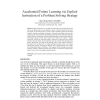Free Online Productivity Tools
i2Speak
i2Symbol
i2OCR
iTex2Img
iWeb2Print
iWeb2Shot
i2Type
iPdf2Split
iPdf2Merge
i2Bopomofo
i2Arabic
i2Style
i2Image
i2PDF
iLatex2Rtf
Sci2ools
AIED
2007
Springer
2007
Springer
Accelerated Future Learning via Explicit Instruction of a Problem Solving Strategy
Explicit instruction in a problem-solving strategy accelerated learning not only in the domain where it was taught but also in a second domain where it was not taught. We present data from a study in which students learned two unrelated deductive domains: probability and physics. During the probability instruction, the Strategy group was trained with an Intelligent Tutoring System (ITS) that explicitly taught a domain-independent backward chaining problem-solving strategy while the No-strategy groups trained with another ITS without any explicit strategy instruction. During the subsequent physics instruction, both groups were trained with the same ITS, which did not explicitly teach any strategy. The Strategy group gained significantly more than the No-strategy group in both domains. Moreover, their gains were evident both on multiple-principle problems, where the strategy should make problem solving more efficient, and on single-principle ones, where the strategy should make no differ...
| Added | 07 Jun 2010 |
| Updated | 07 Jun 2010 |
| Type | Conference |
| Year | 2007 |
| Where | AIED |
| Authors | Min Chi, Kurt VanLehn |
Comments (0)

